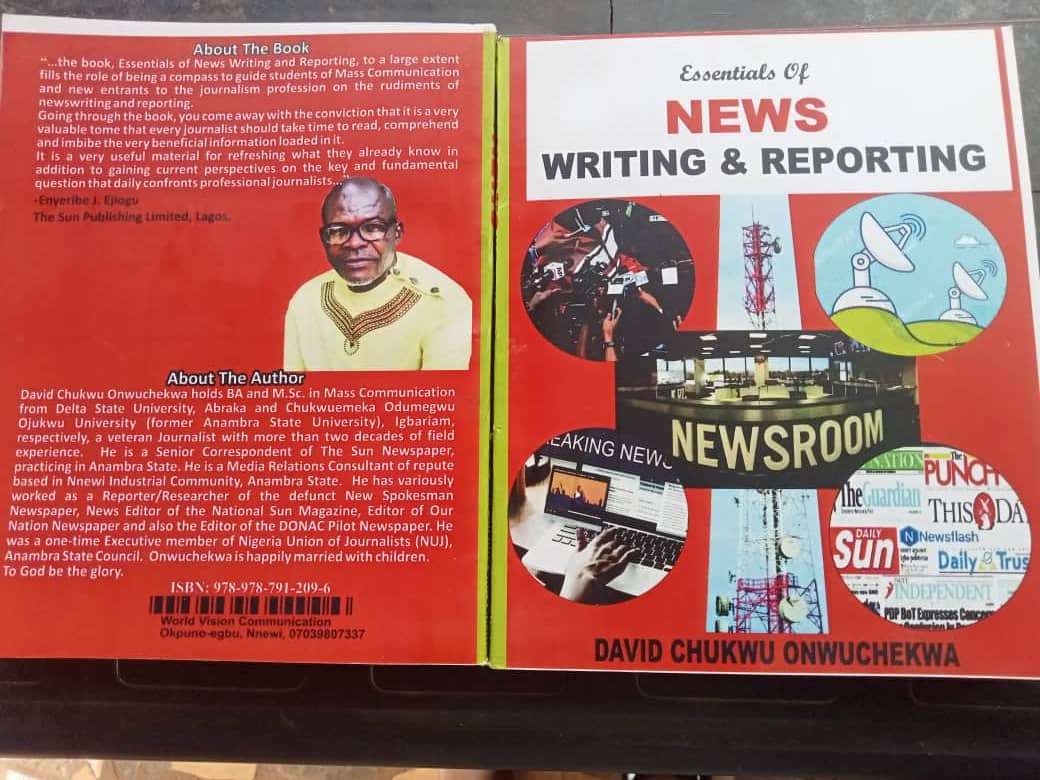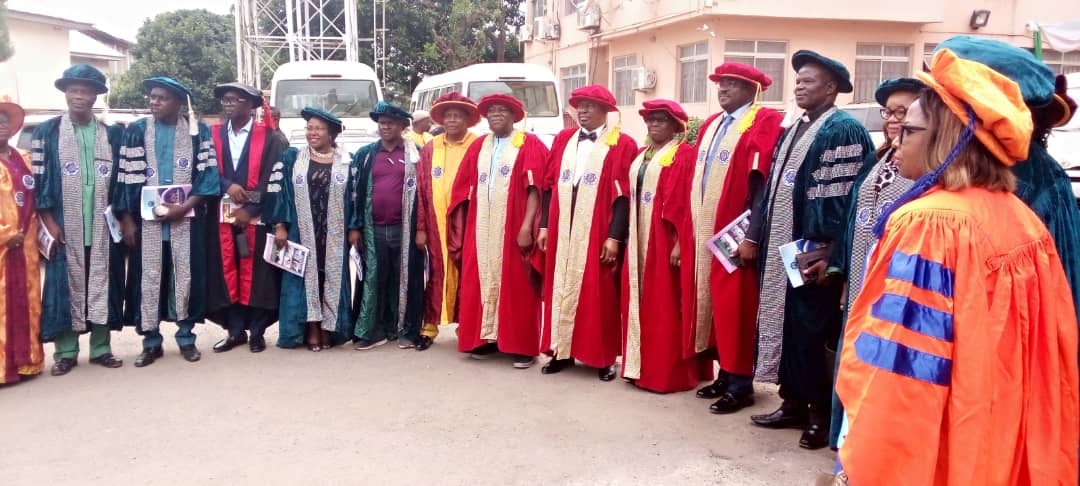Grab Your Copy Now
FORWARD
The book, Essentials of News Writing and Reporting, to a large extent fills the role of being a compass to guide students of Mass
Communication and new entrants to the journalism profession on the rudiments of news writing and reporting.
Going through the book, you come away with the conviction that it is a very valuable tome that every journalist should take time to read, comprehend and imbibe the very beneficial information loaded in it.
It is a very useful material for refreshing what they already know in
addition to gaining current perspectives on the key and fundamental question that daily confronts professional journalists: what is news?
This is more so because the journalism profession today has been
“invaded” by individuals who did not originally set out to study
journalism in school.
Interestingly, some of such “gate-crashers” have done quite well, understood, imbibed and mastered the rudiments of journalism practice.
On the other hand, some graduates of Mass Communication, whether from the universities or polytechnics, who supposedly should be knowledgeable in the rudiments of the rules, ethics and practice of journalism, taught to them while in school, are grossly deficient in the area of writing and reporting news.
It is certainly saddening to note that in several print media
organizations, which publish the most popular mainstream
newspapers in Nigeria, a good number of the reporters are deficient in news writing skills; they can hardly structure a simple news story.
It is even more painful that among them are reporters who have not just the Bachelor’s degree but Master’s in Mass Communication and been in practice for fifteen years or more! It is the individuals within this category that give experienced line editors the biggest headache as they have to practically rewrite their stories, to make them publishable and save their newspapers embarrassment, if by chance such copies get to be published without proper vetting, both for grammar, content, structure, relevance and libel. Some newspapers have had to summarily sack line editors who made the mistake of passing, in the
heat of production deadlines, a copy from a presumably “experienced” reporter without going through the copy with a fine toothpick comb, only to find a blooper in the paper the next morning.
Examples abound but the specific instances will not be cited here, for the sake of decency and to protect the name and public integrity of the concerned newspapers and individuals.
It is against this background that David Onwuchekwa deserves a huge commendation for the painstaking effort he put into researching and writing the book, Essentials of News Writing and Reporting, which eminently qualifies for a place close to the top of any list of books, either specified or recommended for purchase by students of Mass Communication in the universities or polytechnics.
As a matter of fact, the book should be in the libraries of the mainstream newspapers as well as the electronic media organizations, whose presenters and reporters also commit avoidable errors on screen, in the use of prepositions and other syntactic elements of grammar.
As the title suggests, the book deals squarely with the vital
components of news, ranging from defining news, gathering it,
processing the information, structuring, writing and reporting the news item.
With seeming effortless ease, Onwuchekwa takes the reader through an enriching learning experience about what is news as well as the fine art of writing and reporting it, highlighting the grave errors that are still being committed by many not-so-properly-tutored individuals engaged in journalism today, who try to write and report news.
It is such a useful book that distinguished newshounds like Aremo
Segun Osoba (former Ogun State Governor, elder statesman and highly respected Editor, who left indelible footprints in the sands of Nigerian journalism), Sam Amuka-Pemu (publisher of Vanguard), Mike Awoyinfa (of Weekend Concord and The Sun fame, who eats, breathes, sleeps and dreams news) and many others too numerous to mention, will easily applaud. It would not be surprising to find them endorsing the book as a worthy investment every student of Mass Communication should make by buying it, to be properly equipped with the right knowledge about news, which is the core of journalism.
A diligent study of the book will enable the reader to be significantly
grounded to practice the profession properly and ethically, and to
deliver real value to society. More importantly, it will enhance and
boost the personal development and sustenance of the reportorial and news writing skills of journalists.
Enyeribe J. Ejiogu
The Sun Publishing Limited
08116758886 & 08079056287 enyeribee@yahoo.com
Acknowledgements
First of all, I am grateful to Almighty God for His tender mercies which made it possible for this work to come to fruition.
Many people played supportive roles in the course of writing this book.
Indeed, I express my gratitude to many authors, scholars, copyright holders and publishers from whose materials and works I made derivations to complement my ideas and knowledge in writing this book.
I thank Mr Enyeribe. J. Ejiogu, a veteran journalist with The Sun
Publishing Limited, Lagos who has won many awards of excellence in the field of journalism, a seasoned journalist. He did not only encourage me when I started the work but he also accepted to write the Forward. I owe him a debt of gratitude.
I also show gratitude to the Managing Director of The Sun Publishing Limited, Lagos, Mr Onuoha Ukeh and the entire Sun family for the commendation I received from the House when I rolled out my first work titled: Practical Approach To Journalism & Media Studies, Ebiogwu’s Concept. The commendation boosted my desire to embark on this second work. I am grateful to you all.
Thanks to the members of my immediate constituency, the Nigeria
Union of Journalists (NUJ), Anambra State Council under the
Chairmanship of Dr Emeka Odogwu Emeka and my professional colleagues in the NUJ Anambra State Correspondents’ Chapel, Awka led by Comrade Chuks Ilozue. Yes, their commendation when I introduced my first book was in no small measure a morale booster.
I remember in a special way some of my lecturers at Chukwuemeka Odumegwu Ojukwu University (former Anambra State University), Igbariam Campus in the years of my post graduate studies.
They are Professor Angela Nkiru Nwammuo; Professor Venatus . N. Agbanu; Professor Chinyere Nwabueze and Professor Levi Chinaka Nwodu of blessed memory. Thank you all immensely for the nurture.
My wife, Vera who did the typesetting of the work at the expense of
her other business activities and leisure deserves special gratitude.
Our children: Nnennaya, Chidimma and King-David also made their own contributions one way or the other. I say thanks to you all.
Preface
Journalism practice has suffered bastardization over the years due to ill training of some of the professionals which has led to steady erosion of standard especially in this era of new media where citizen journalists have invaded the media industry without apology.
Even the mainstream media are not spared because of the engagement of non professionals by the media operators who have little or no regard for ethics. This has created a big vacuum towards achieving excellent journalism with the attendant negative effects on nation building.
War, peace, economic growth, security or insecurity, civil unrest,
societal ills, social coherence and other indices are undoubtedly
products of good or bad media practice.
The media can make or mar. That is why it is imperative that what is dished out to media consumers must be properly vetted. This can only be achieved through sound and conscious training and retraining of the news purveyors.
Any condition a nation finds itself is traceable to actions or inactions of the media. That is why the managers of the media industry including the social media are liable to give account of what a nation suffers or enjoys within its territorial integrity.
The daily increase in the burden of non professional reports emanating from supposedly trained journalists and citizen journalists has made it expedient to come up with a guide to media professionals and trainees in the industry to follow.
To this end, Essentials of News Writing & Reporting written by an experienced media professional of over twenty years standing has come on board after an intensive research to assist those already in the field of journalism and students to become professionals of high repute.
This book with twelve chapters spares no area to make sure that media professionals both in the print and electronic media (including social media) are properly guided to get it right to avoid negative effect unprofessional reports or broadcast could generate in society.
It is at this backdrop that Essentials of News Writing & Reporting is highly recommended for professionals and students alike. Many in the field of journalism migrate from other fields of study without the rudiments of media practice.
It is true that some of those gate-crashers can write stories that are
appealing to media consumers, but the pertinent question is: are those stories packaged with professional standards, paying attention to objectivity, fairness, balance and all other ingredients needed to have a wholesome report?
In this connection, Essentials of News Writing & Reporting with its well packaged twelve Chapters serves as a rudder to guide practicing journalists and students of journalism or Mass Communication to embrace the best world standard in media practice.
Presented in twelve Chapters, Chapter One defines what news is, its historical background and news as a saleable item. It explains news purveyors, geographical location of news, news value, its criteria and how news can be sourced. The Chapter mentions controversies in news, disagreements, and rivalries among other things.
In Chapter Two, titled News Judgement, attention is paid to the
construction of news as a mediated product rather than a natural
phenomenon or simple reflection of objective reality in journalism.
The Chapter has it that instead of asking why events become news, that the question should be how events are presented as news. It is understood in Chapter Two that newsworthiness is fundamentally guided through the application of news values such as impact, timeliness, prominence, proximity, novelty, conflict and currency in the process of choosing and constructing news.
Fairness in journalism is treated in Chapter Three. It discusses the
professional requirement that someone involved in a story should be given an opportunity to react and respond to a story before publication or broadcast according to the doctrine of fairness.
It discusses editorial control, integrity in journalism, ethical principles for journalists, reporting the truth, minimizing harm, acting independently, accountability and transparency.
The Chapter also treats ethical principles for citizen journalists and
media consumers.
Other areas include objectivity in reporting, false balance, no comment syndrome and interviewing techniques…………….Details in the Book.
Provisions are also made for Print and Electronic Media Glossaries to assist the reader to get acquainted with the vital media terminologies.
Contact: 08039599988




